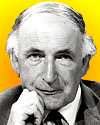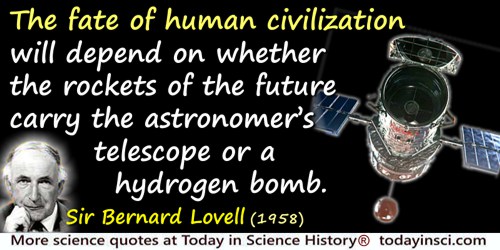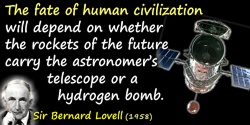 (source)
(source)
|
Sir Bernard Lovell
(31 Aug 1913 - 6 Aug 2012)
English radio astronomer and physicist who steered the founding of the Jodrell Bank Observatory and its 250-ft diameter radio telescope (1957). He served as its first director from 1945 to 1980.
|
Science Quotes by Sir Bernard Lovell (5 quotes)
A study of history shows that civilizations that abandon the quest for knowledge are doomed to disintegration.
— Sir Bernard Lovell
In The Observer (14 May 1972), 'Sayings of the Week'. As cited in Bill Swainson, The Encarta Book of Quotations (2000), 579.
Out of all possible universes, the only one which can exist, in the sense that it can be known, is simply the one which satisfies the narrow conditions necessary for the development of intelligent life.
— Sir Bernard Lovell
From In the Centre of Immensities: Creation (1979), as cited in Bill Swainson, The Encarta Book of Quotations (2000), 579.
The fate of human civilization will depend on whether the rockets of the future carry the astronomer’s telescope or a hydrogen bomb.
— Sir Bernard Lovell
Concluding remark, BBC Reith Lecture (30 Nov 1958), 'Astronomy and the State', published as The Individual and the Universe (1959, 1961), 73.
The pursuit of the good and evil are now linked in astronomy as in almost all science. … The fate of human civilization will depend on whether the rockets of the future carry the astronomer’s telescope or a hydrogen bomb.
— Sir Bernard Lovell
In BBC Reith Lecture (30 Nov 1958), 'Astronomy and the State', published as The Individual and the Universe (1959, 1961), 72.
The successful launching of the Sputnik was a demonstration of one of the highest scientific and technological achievements of man—a tantalizing invitation both to the militarist in search of ever more devastating means of destruction and to the astronomer searching for new means of carrying his instruments away from their earthbound environment.
— Sir Bernard Lovell
In BBC Reith Lecture (9 Nov 1958), 'Astronomy Breaks Free', published as The Individual and the Universe (1959, 1961), 72.
See also:
- 31 Aug - short biography, births, deaths and events on date of Lovell's birth.
- The Story of Jodrell Bank, by Bernard Lovell. - book suggestion.




 In science it often happens that scientists say, 'You know that's a really good argument; my position is mistaken,' and then they would actually change their minds and you never hear that old view from them again. They really do it. It doesn't happen as often as it should, because scientists are human and change is sometimes painful. But it happens every day. I cannot recall the last time something like that happened in politics or religion.
(1987) --
In science it often happens that scientists say, 'You know that's a really good argument; my position is mistaken,' and then they would actually change their minds and you never hear that old view from them again. They really do it. It doesn't happen as often as it should, because scientists are human and change is sometimes painful. But it happens every day. I cannot recall the last time something like that happened in politics or religion.
(1987) -- 


